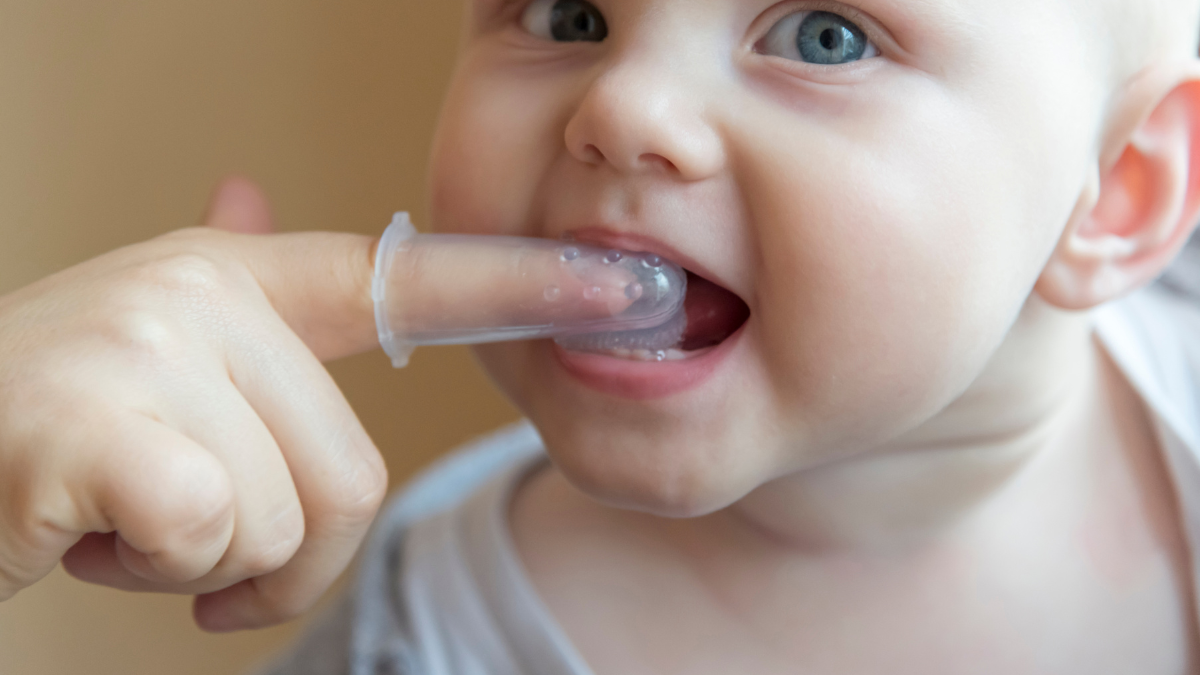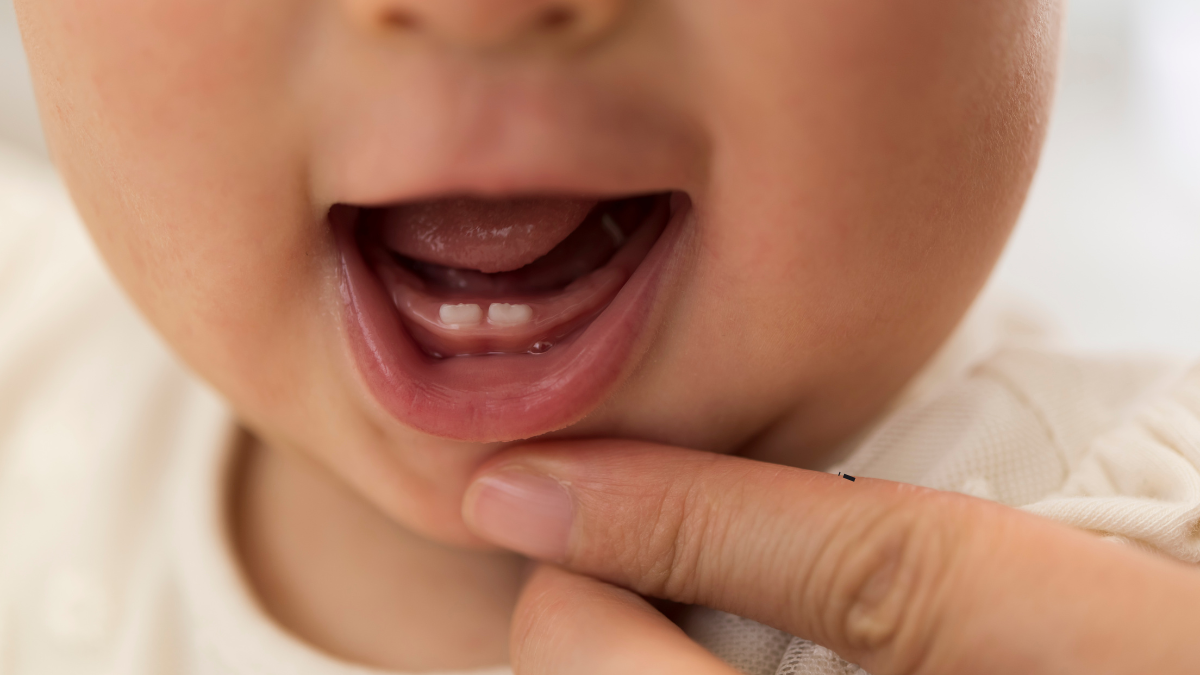Teething is one of the most difficult milestones you will experience as a parent. It’s an exciting period because it marks the time when you can introduce your baby to semi-solids or even solid food as they get older.
However, it can also be a period filled with pain and discomfort for your little one. Understanding some of the common signs of teething can help you identify what your baby is going through and learn how to manage the symptoms effectively.
Teething is a natural part of your baby’s development, typically starting between 4 and 7 months. However, it can begin before or after this stage, and some babies may pass through this milestone with little discomfort.
On the other hand, some babies experience a lot of pain and become generally more irritable during this time. If you’re unsure about the signs and symptoms of teething, this guide will help you understand what to look for.
Here are some signs that indicate it’s teething time:

15 Signs of Baby Teething
1. Drooling a Lot
When babies teethe, they begin to drool excessively. This is because the teeth trying to push through the gums stimulate the baby’s salivary glands, leading to an increase in saliva production.
Excessive drooling is a sign that your baby’s teeth are about to come through. However, too much drooling can cause irritation around the chin and neck area. The best way to handle this is by gently wiping your baby’s face with a clean cloth to keep the area dry and clean.
Related: 7 Things to Do When Your Baby Is Teething
2. Constant Chewing
If your baby suddenly starts chewing on everything in sight, it’s a sign that they are teething. This is a natural response to the pressure and discomfort they feel as the teeth push through their gums. You’ll notice your baby chewing on toys, fingers, and even their clothes. Offering specially designed teething toys can help soothe the discomfort in your baby’s gums.
3. Irritability/Fussiness
Teething can be painful for babies. As their gums become swollen and sore, they may experience a lot of discomfort, leading to irritability and fussiness.
This phase can last for several days or even weeks, depending on when the tooth breaks through the gums. The best thing you can do for your baby is to offer plenty of cuddles, extra playtime, rocking, and other soothing activities to provide comfort.
Related: How to Help Your Baby Sleep Better
4. Slight Fever
Teething can cause a slight increase in body temperature, which is usually not a cause for concern. However, if the temperature continues to rise, it could be an indication of something else, as a high fever is not typically a sign of teething. Make sure your baby stays hydrated and comfortable, and monitor their temperature carefully.
5. Changes in Appetite
A loss of appetite is another common sign of teething. The discomfort in their swollen gums can make it painful for babies to chew, leading them to refuse breast milk, formula, or solid foods. Babies who are formula-fed or on semi-solids may also refuse to eat due to the pressure on their gums. To help alleviate the discomfort, provide cold, soft foods and chilled teething toys or gels to numb their gums.
Related: How to Treat Yeast Diaper Rash
6. Swollen or Red Gums
Swollen and red gums are some of the most visible signs of teething. Your baby’s gums will become puffy and inflamed, especially around the area where the tooth is emerging. This can cause significant discomfort. You can help soothe the swelling by gently massaging their gums with a clean finger or offering a chilled teething ring or toy.
7. Sleep Disturbances
Teething can also disrupt your baby’s sleep patterns. As the tooth breaks through, the pain can become more intense, causing your baby to wake up more frequently than usual. This is particularly common during the early stages of teething when the discomfort is at its peak. Offering extra comfort, such as rocking, swaddling, or giving them a soft teething toy, can help your baby sleep better.
Related: What Are White Curds in Babies? Causes, Symptoms, and What to Do
8. Constant Face or Ear Rubbing
If your baby is rubbing their face or tugging at their ears, it’s a sign that they may be teething. The pain from the gums can radiate to other parts of the face, particularly the ears. The act of biting or chewing can put pressure on the gums, which often causes discomfort in the ear area. If this behavior persists, however, it may be a sign of an ear infection, so check for other symptoms.
9. Loose/Diarrhea Stool
Some babies may experience looser stools or even diarrhea while teething. This is usually not a serious concern, but it’s important to monitor your baby’s hydration and overall health. If the diarrhea persists or becomes severe, it’s a good idea to consult your pediatrician to rule out other causes.
Related: 10 Reassuring Signs Your Baby Is Doing Just Fine
10. Gnawing on Hands/Fingers
Babies instinctively chew on their hands and fingers while teething because it helps relieve the pressure and soreness in their gums. This is a very common behavior. While it’s normal, it’s important to keep their hands clean and offer them a teething ring or toy if they seem to be constantly gnawing on their fingers.
11. Drool Rash
Drool rash is a common result of excessive drooling during teething. The constant wetness around your baby’s mouth, chin, and neck can irritate their sensitive skin, causing redness and chapping. To prevent this, make sure to keep the area clean and dry by wiping it with a soft cloth.
12. Excessive Crying
Crying more than usual is another sign that your baby may be teething. The discomfort from swollen gums can make your baby cry more frequently, especially if the pain is intense.
If your baby’s crying seems louder and more persistent than usual, it’s likely due to the pain caused by teething. Offering comfort, cuddles, and teething toys can help soothe your baby. If the crying continues and seems excessive, consult your pediatrician.
13. Unusual Biting Behavior
Babies may bite more often when teething. This can occur during playtime, eating, or even when interacting with parents and caregivers. Biting helps relieve the pressure on their gums. While this is normal, be cautious if they begin biting things that aren’t safe, such as fingers or sharp objects.
14. Shiny/Glossy Gums
Teething gums can become shiny or glossy due to inflammation and swelling. The pressure of the tooth breaking through makes the gums appear smooth and shiny. This is a typical part of the teething process, but if your baby’s gums seem unusually swollen or show signs of infection, it’s important to seek medical advice.
15. Nasal Congestion
Teething can cause nasal congestion in some babies, likely due to irritation in the sinuses or increased mucus production. If your baby has a stuffy nose but no other signs of illness, it is probably related to teething. However, if your baby develops a cough or other signs of illness, consult your pediatrician.
Conclusion
Teething is a natural and necessary part of your baby’s development, but it can be a challenging experience for both you and your baby. If you are ever unsure or concerned about your baby’s symptoms, don’t hesitate to reach out to your pediatrician for guidance.
Save pin for later

- 8th Month Pregnancy Care: What To Expect, Dos And Don’ts - January 17, 2026
- 80 Beautiful Hispanic Girl Names for Your Baby - January 8, 2026
- 7 Physical Signs Your Baby Still Isn’t Ready to Come Out - November 28, 2025



